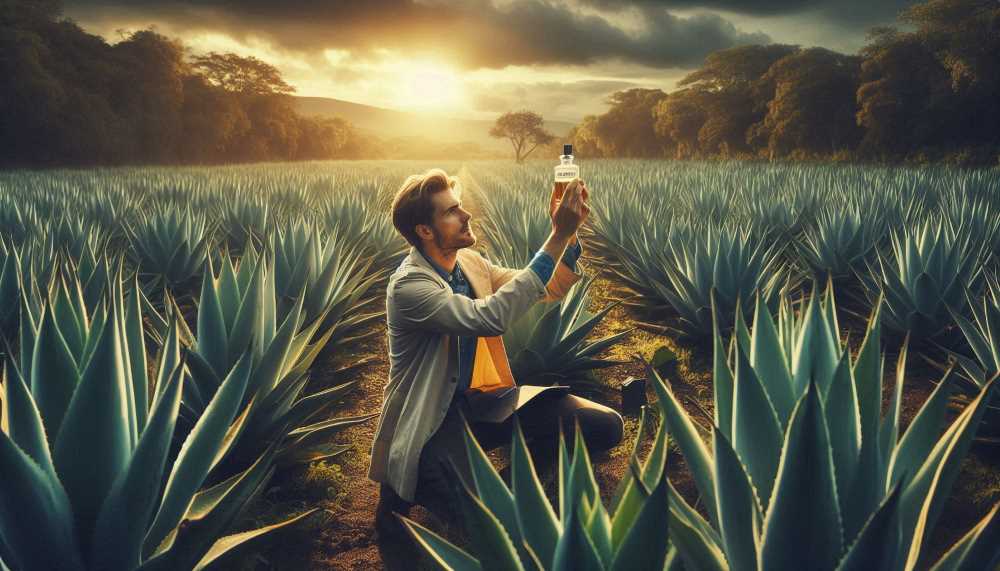Is Your Tequila a Hybrid? New Genetic Findings Shake Industry
Genetic sequencing of agave, particularly the blue variety used for tequila, is underway to understand the plant better and protect it from climate change and diseases.

The genetic sequencing of agaves, including the blue variety Agave tequilana weber, will allow us to better respond to variations generated by climate change or to confront diseases that affect tequila production, says a researcher from the UNAM Institute of Ecology, Luis Enrique Eguiarte Fruns.
On the occasion of International Tequila Day, the expert explains in an interview that specialists from higher education institutions in Mexico and the United States are involved in this project of genetic sequencing of various agave variants, with the purpose of understanding in depth why this plant produces too much sugar, grows quickly, and generates the best drinks.
The researcher from the Laboratory of Molecular and Experimental Evolution of the National University specifies: in the face of global warming and diseases, we will be able to know the genetic bases of susceptibility or find the genes that will help us survive if the temperature increases one or two degrees, or the environments become drier.
The genome of the agave used to produce tequila is currently assembled, but the information obtained indicates that, apparently, the plant that was sequenced is a hybrid. Therefore, it is not known if all tequila magueys are like this or if the one that was processed was, which is why new genetic tests are being carried out to review the information. “We are very excited because we will finally understand why producers like this clone so much.”
All agaves are native to America, most have their origin in Mexico, and although they are essentially genetically diverse, the industry only uses the Agave tequilana weber blue variety, with which one million 519 thousand tons of tequila agave were produced in 2020, according to the Agricultural and Fisheries Information Service of the Government of Mexico.
Currently, Jalisco produces 74 percent of the national tequila, but Guanajuato, Nayarit, Michoacán and Sinaloa also participate in this industry.
The aforementioned event, which is celebrated on July 24, was instituted in 2006 when UNESCO declared the landscapes of the agave plantations and the old industrial facilities of the municipality of Tequila, Jalisco, as Cultural Heritage.
According to Eguiarte Fruns, the protection of the blue agave is due to the concern of the industry for the designation of origin, although the example of France could be followed, where the production standards do not specify the exact grapes used in the production of their wines, they only mention that this fruit grew in a certain region, that it was worked and fermented in certain areas of France, with traditional processes.
But since it is used only for the production of tequila, there is today concern due to the modification in the climate because it will be affected, especially in the region of Jalisco, which in the future could cause problems due to heat and droughts.
Eguiarte Fruns has dedicated a large part of his career to the study of agaves, which are pollinated by bats; he joined the development of a catalogue of the plant's variants, especially the wild ones, after being invited by the National Commission for the Knowledge and Use of Biodiversity (Conabio).
The expert from the Department of Evolutionary Ecology at the IE asserts that, in general, they are the plants with the most genetic variation, which means that within each species, it was necessary to investigate their characteristics. A report prepared by scientists from the Center for Research and Advanced Studies on the fact that tequila agaves lacked genetic variation generated concern, since being identical and a disease emerging, it could kill them all.
Eguiarte Fruns highlights: In addition to this, Rodrigo Medellín started the Bat Friendly project, which promotes the care of pollinators and their variants; In addition, Rodolfo Valiente began working with different mezcal agaves, and invited us to participate in a plan to design better practices in order to solve the problem that originally interested Conabio, about whether plants and genetic variation are being lost.
The current work of the research team aims to review the tequila genome in a more precise way. Specifically, while previously only a hundred points were studied, today's technology allows thousands to be examined with great resolution.
The genome used for tequila production has more than 30 thousand different genes –its genome is larger than that of humans– and now the challenge is to find the general correlations between the genes and the characteristics of the plant. The first results indicate that the plant used in Los Altos de Jalisco is not a clone, as it has some genetic variation, so Eguiarte Fruns says the industry's practices are being reviewed.
Other populations believed to be the ancestor of the tequila agave are also being analyzed, so the researchers' study will ultimately benefit producers of beverages such as mezcal or bacanora in Mexico.




